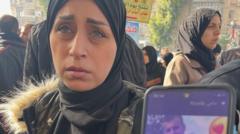In a poignant display of grief and desperation, Syrians are flocking to Mustahed Hospital in Damascus, searching for information on their missing loved ones in the wake of years of brutality under President Bashar al-Assad's regime. Outside, a painted wall adorned with photographs illustrates the grim toll of his 50-year rule, showcasing faces twisted in pain, indicative of the suffering prisoners endured.
This growing crowd of relatives, comprised of wives, siblings, and parents, is driven primarily by the hope of finding a body to bury. Armed with smartphones, many film the photos, hoping for a morsel of recognition amidst the anguish. As they approach the mortuary, the stark reality becomes evident: 35 bodies, some in a state of severe decomposition, fill the facility, underscoring the grim fate of those imprisoned.
Inside the morgue, the sight is gut-wrenching. Emaciated figures bearing unmistakable signs of torture line the concrete floor, offering a distressing glimpse into the depth of suffering inflicted by the regime. Dr. Raghad Attar, a forensic dentist working on identification efforts, battles her emotions as she reflects on the families' pain, expressing her sentiments of sorrow and the deep desire for assistance from the international community to help heal the nation post-conflict.
Among the visitors is Noor, who clutches a mask as she searches for her brother, taken in 2012. Her hope lies in discovering his body, providing closure to the aching uncertainty that has plagued her family since his disappearance. Each visitor carries with them stories of loss, enduring the pain of unanswered questions and an urgent need for resolution.
As the families confront the ghosts of Syria's past, they simultaneously yearn for a future devoid of fear. Many are haunted by memories, discussing the arbitrary detentions and complex dynamics that led to their loved ones' imprisonment. This search for closure is compounded by the weight of collective trauma that transcends generations, leaving an indelible mark on the Syrian populace.
Beyond the walls of Mustahed Hospital, sentiments of loss and hope interweave, and cries for justice echo through the city. With the collapse of the Assad regime and the potential for new leadership, whispers of revenge and the desire for accountability grow louder among those who seek to reclaim their stolen lives and memory.
From a backdrop of fear and uncertainty emerges a flicker of hope as the Syrian people contemplate their future. With the regime's enduring influence slowly dissipating, the families yearning for justice are poised at the edge of redefining their lives, and the struggle for recognition and healing remains critical in this transformative period for Syria.
This growing crowd of relatives, comprised of wives, siblings, and parents, is driven primarily by the hope of finding a body to bury. Armed with smartphones, many film the photos, hoping for a morsel of recognition amidst the anguish. As they approach the mortuary, the stark reality becomes evident: 35 bodies, some in a state of severe decomposition, fill the facility, underscoring the grim fate of those imprisoned.
Inside the morgue, the sight is gut-wrenching. Emaciated figures bearing unmistakable signs of torture line the concrete floor, offering a distressing glimpse into the depth of suffering inflicted by the regime. Dr. Raghad Attar, a forensic dentist working on identification efforts, battles her emotions as she reflects on the families' pain, expressing her sentiments of sorrow and the deep desire for assistance from the international community to help heal the nation post-conflict.
Among the visitors is Noor, who clutches a mask as she searches for her brother, taken in 2012. Her hope lies in discovering his body, providing closure to the aching uncertainty that has plagued her family since his disappearance. Each visitor carries with them stories of loss, enduring the pain of unanswered questions and an urgent need for resolution.
As the families confront the ghosts of Syria's past, they simultaneously yearn for a future devoid of fear. Many are haunted by memories, discussing the arbitrary detentions and complex dynamics that led to their loved ones' imprisonment. This search for closure is compounded by the weight of collective trauma that transcends generations, leaving an indelible mark on the Syrian populace.
Beyond the walls of Mustahed Hospital, sentiments of loss and hope interweave, and cries for justice echo through the city. With the collapse of the Assad regime and the potential for new leadership, whispers of revenge and the desire for accountability grow louder among those who seek to reclaim their stolen lives and memory.
From a backdrop of fear and uncertainty emerges a flicker of hope as the Syrian people contemplate their future. With the regime's enduring influence slowly dissipating, the families yearning for justice are poised at the edge of redefining their lives, and the struggle for recognition and healing remains critical in this transformative period for Syria.





















